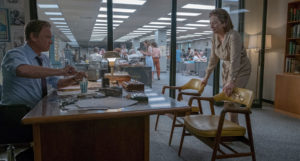
The Post Defends the Freedom of the Press
Although people rail against journalists and media for having bias, leaking stories, or disseminating fake news, it’s hard to imagine a democracy without the press working to obtain the truth. Although a free press is enshrined in the First Amendment, that hasn’t stopped the government from attempting to stifle it throughout U.S. history. One of the most famous attacks on the press is the heart of Steven Spielberg’s new film, The Post, is a faithful depiction of the Nixon White House’s attempt to stop the release of the so-called Pentagon Papers and the efforts by the newspapers to fight back.
The Post is a very well-crafted story with great performances from a stacked cast. The main draw for audiences will be the pairing of (arguably) the best working actors alive, Tom Hanks and Meryl Streep. Hanks has collaborated with Stephen Spielberg several times, but this marks a first-time with Streep. Although the pair are excellent in their performances, this film showcases strong turns from the entire cast. The casting effort resembles Spielberg’s Lincoln where even the smallest role went to someone who could be a lead in another project. Even though a large collection of famous actors can sometimes distract from a movie, each actor feels natural in their role in The Post.
The film opens in 1965 in the jungles of Vietnam with a group of U.S. troops who are ambushed by enemy fire while patrolling at night. Imbedded within these troops is a defense contractor, Daniel Ellsberg (Matthew Rhys, The Americans), who is working on an intensive study of American involvement in Vietnam for his boss, Robert McNamara (Bruce Greenwood, Batman: Gotham by Gaslight, 2018), the Secretary of Defense to both Presidents Kennedy and Johnson. On the flight back to the U.S., McNamara asks Ellsberg if he thinks the situation is getting worse or better. Unexpectedly, Ellsberg replies that things have stayed the same. McNamara disagrees with this assessment, pointing out that since the U.S. has increased its efforts without any gains then the situation must be getting worse. Despite Ellsberg’s opinion, when McNamara steps off of the plane to a flock of D.C. reporters, he declares that the U.S. is close to winning the war.
The story then cuts five years later to the offices of the Washington Post, which is owned by Kay Graham (Meryl Streep, Florence Foster Jenkins, 2016) whose family has owned the paper since the Great Depression. Kay became publisher after her husband’s death (who was chosen to run the company by Kay’s father) and is now in in the midst of taking the company public. Despite having grown up with the Washington Post and her extensive social and political network, Kay’s board of directors privately lack faith in her ability to manage the company as publisher because she is a woman. Meanwhile, Kay’s managing editor, Ben Bradlee (Tom Hanks, Sully, 2016) is challenging his staff to find stories that bring the paper meaningful publicity despite a combative relationship with the Nixon Administration. The reporters are being shunned from the White House (including the First Daughter’s wedding) and are struggling as a result.
As this chaos unfolds, the country is rocked by stories published by the rival New York Times that describes a government cover-up over the Vietnam War since the Eisenhower era. What makes this report so shocking is that the articles quote highly classified Pentagon studies that were authorized by the former Secretary of Defense, Robert McNamara, several years ago. The Nixon White House (through the Attorney General) fires back at the New York Times with an injunction that prohibits publishing anything further from the studies. With the New York Times out of commission, every other newspaper is now scrambling to get access to these secret documents, especially The Washington Post. Eventually, The Post obtains the papers through a contact of veteran reporter Ben Bagdikian (Bob Odenkirk, Better Call Saul). Although these papers are a huge score for the paper, it also represents a dilemma as publishing information from leaked reports that are under injunction could result in imprisonment and could derail the public offering of the company. Graham, Bradlee, and The Washington Post staff now must weigh their responsibilities as journalists against the threats and pressures of the government and their future investors.
Spielberg is excellent in his direction as he distills what seems like a complex history lesson into an engaging film as he did in Bridge of Spies (2015) and Lincoln (2012). Although these films will not be as beloved as the blockbuster film that immortalized him, his recent films are no less impressive when you consider his breakout film Jaws premiered more than 40 years ago. Spielberg clearly felt this was an important film to prioritize as he put off all of his other projects after reading the screenplay saying, “this was a story I felt we needed to tell today.”
Although the cast and direction were great, the movie is not perfect. Some people may find this to be too much of a glorified civics lesson as its lacks romance and action. In addition, the story can be a little confusing as there are (while well-performed) too many characters. Despite these flaws, the main themes regarding the role of a free press should be clear even to an audience that isn’t familiar with the story. Of course, some people may just find it refreshing to look back at an era when 24-hour cable and Twitter didn’t dominate the news and will think, “those were the days.”
Bottom Line: Spielberg provides another captivating history lesson with The Post that feels more relevant than ever in today’s overheated media landscape and its relationship with the White House.
Credits: Directed by Stephen Spielberg; Written by Liz Hannah and Josh Singer
Cast: Tom Hanks (Ben Bradlee), Meryl Streep (Kay Graham), Bob Odenkirk (Ben Bagdikian), Alison Brie (Lally Weymouth), Matthew Rhys (Joseph Ellsberg), Bradley Whitford (Arthur Parsons), Bruce Greenwood (Robert McNamara), Carrie Coon (Meg Greenfield), Tracy Letts (Fritz Beebe)
Studio: 20th Century Fox
Running Time: 116 minutes
Jessica DeLong © December 23, 2017
